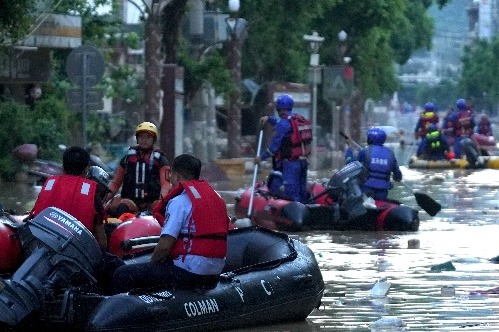Chronicle of Xi's leadership in China's war against coronavirus


INSTITUTIONAL STRENGTHS GIVEN FULL PLAY
Xi stressed that it is imperative to coordinate national response measures to fight the outbreak, adding that concentrating strength to accomplish big tasks is an advantage of China's socialist system.
Support was summoned from across the nation. All jumped into action after Xi, as the leadership core of the CPC Central Committee and the Party, issued his orders.
A central leading group on the epidemic response was set up on Jan 25. Vice Premier Sun Chunlan, a member of the Political Bureau of the CPC Central Committee, led a central guiding group to oversee work on the ground in Hubei for three months.
"Whatever situations it encounters or whatever needs it has, the group can directly phone me," said Xi, who made more than 100 instructions to the group.
Under Xi's leadership, more than 90 million CPC members and 4.6 million grassroots Party organizations joined the battle.
"The general secretary says the interests of the people come above all else. We, as Party members, must be at the forefront," said Xia Jian, secretary of a Party branch at Zhongnan Hospital of Wuhan University.
Some lost their lives after they were infected on the front line while attending to patients. Liu Zhiming, president of Wuchang Hospital, and Li Wenliang, an ophthalmologist at the Central Hospital of Wuhan, were among the fallen heroes honored as martyrs, a title given to citizens who bravely sacrifice their lives for the nation and the people.
Employees who are Party members also took the lead to work around the clock in fields closely connected with epidemic control such as building hospitals and producing masks.
Heeding Xi's order, the military sent its first group of medics to Wuhan on Chinese New Year's Eve. In total, three groups involving over 4,000 service personnel were dispatched. Supplies were airlifted to Wuhan by large transport aircraft.
China mobilized the best doctors, the most advanced equipment and the most needed resources to assist the all-out fight against the virus in Hubei and Wuhan, with all treatment expenses covered by the government, Xi said during the "two sessions."
Robert Kuhn, a leading US scholar on China studies and chairman of the Kuhn Foundation, described China's mobilization as "unprecedented" in global health history.
Across China, over 42,000 medical workers, including academicians and top experts, were sent to Hubei. They endured tremendous fatigue and stress, and paid a heavy price. More than 2,000 medical workers were infected, and scores died in the line of duty.
In Wuhan, 16 exhibition halls and sports venues were converted into makeshift hospitals. Dozens of hospitals were repurposed. More than 600 venues were used for quarantine sites. All these measures helped add about 3,000 beds on a daily basis, easing the strain on hospital beds in the city.
"The key learning from China is speed," said Canadian epidemiologist Bruce Aylward, who led a team of WHO-organized international experts to China for a nine-day joint mission on COVID-19 in February.
Outside the hard-hit zone, the manufacturing of medical supplies was cranked up and "green passages" were opened. In a short time, everything from masks to life support equipment was rushed to the front line.
At the height of the outbreak, Hubei accumulated more than 100 extracorporeal membrane oxygenation (ECMO) machines, about a quarter of the nation's total of these sophisticated life support systems.
Xi ordered leveraging the country's institutional strength of "pairing" support. Nineteen provincial regions were "paired" with 16 cities and prefectures in Hubei to help them contain the outbreak.
Xi said science and technology hold the key to "eventually prevailing over the outbreak." He demanded research to be fast-tracked to solve key issues while meeting all safety standards.
Universities, research institutes and businesses across the country joined forces to develop vaccines, medicines and treatment. A vaccine developed by Chinese researchers was the world's first to enter phase-two clinical trials on April 12. By July 23, nine enterprises in China had started clinical trials of COVID-19 vaccines. The emergency use of COVID-19 vaccines has also started.
In a country with a huge population of 1.4 billion, people acted orderly; they took the Party and government's advice seriously, staying at home for weeks and practicing social distancing.
Over 4 million community workers were mobilized to regularly disinfect public spaces, check body temperatures, and register visitors and take them to quarantine if necessary.
Grid management and neighborhood watches were initiated in some cities to detect and isolate suspected cases and their close contacts as soon as possible. Many volunteers showed up to help.
"Communities have made huge contributions in this epidemic response," Xi told community workers during a tree-planting activity in Beijing. "Looking forward, there are still formidable tasks ahead."
China's approach, truly mobilizing all of government and all of society, is estimated to have averted hundreds of thousands of COVID-19 cases, according to a report by the WHO-China Joint Mission on COVID-19.
International medical journal The Lancet said there are important lessons that presidents and prime ministers can learn from China's experience, highlighting the role of public health measures, such as surveillance and exhaustive contact tracing, in delaying the spread of infection.
China's COVID-19 fight offers three important pieces of experience to the world: talk to the public, slow the transmission of the disease, and prepare health systems for a spike in demand, according to the London-based magazine The Economist.























